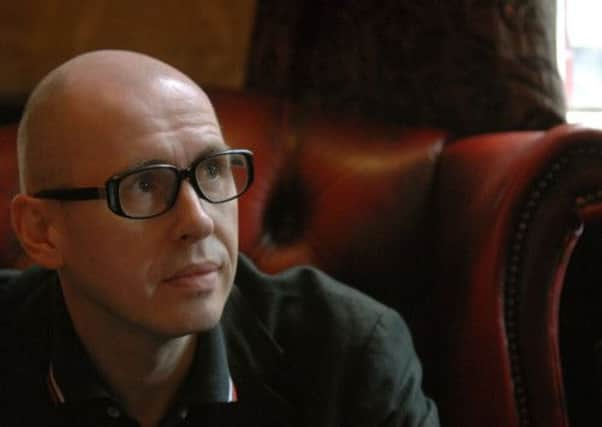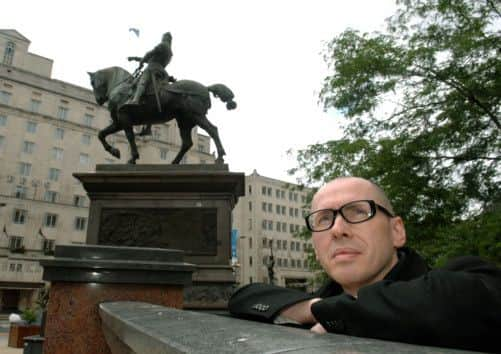The Big Interview: David Peace


David Peace is infuriating.
Most have achieved much less and crow much more about their achievements. Peace has seen his novels turned into movies, award-winning television dramas, his work has been sold around the world and translated into different languages and yet the first review of his new book he mentions is from a website which does not sing the praises of Red or Dead.
“It’s described as ‘tedious in the extreme’,” laughs Peace. “My daughter showed me that particular review.”


Advertisement
Hide AdAdvertisement
Hide AdIt’s not just his daughter who makes sure Peace remains grounded. What prevents his head from being in the clouds and his ego soaring out of control is the fact that, despite now living in Tokyo, his West Yorkshire roots run deep.
The faithful were out in force when Peace made his latest trip to the Broad Acres. A total of 190 readers and fans of his work crammed into the second floor of Leeds’ Waterstones last month to hear the author officially launch his latest novel.
Red or Dead sees Peace enter the head of the legendary Liverpool manager Bill Shankly.
The last time Peace went into the head of a football manager the results, it’s fair to say, were something of a mixed bag. Not critically, you understand – few were able to throw brickbats at the vivid style of Peace’s writing, showcased at its best in The Damned United. No, the mixed bag refers to the way the work was received by fans. Many were angry at what they saw as Peace’s sullying of the sacrosanct memory of their team at the height of its powers.
Advertisement
Hide AdAdvertisement
Hide AdThe focus of The Damned United was Brian Clough during the turbulent and very short time he spent as manager of Leeds United. The book was so popular among certain circles, however, that it was picked up by a film production company and very quickly turned into a movie, starring Michael Sheen. It was remarkable how quickly it went from the page to the screen – it was a matter of a couple of years in a business which has notoriously slow cranking mechanisms.
It’s easy to wonder if the people behind the movie version of The Damned United were mindful of making the most of the heat from the fire of controversy the book sparked. Leeds United fans and players, past and present, had issues with Peace’s imagining of what was happening inside Clough’s head.
He expects no such trouble with Red or Dead. This time he has chosen to write about another football manager, but has selected the subject matter with a little more care. No hagiography, in Red or Dead he celebrates the brilliance of one of English football’s truly great managers in Bill Shankly.
Given the controversy surrounding a book the last time he imagined himself into the head of a football manager, is he concerned this time?
Peace is straight on the back foot.
Advertisement
Hide AdAdvertisement
Hide Ad“I have nothing against Leeds United,” says the Huddersfield Town lifelong fan.
“In fact, for a Huddersfield Town fan, some might say I have an unhealthy obsession with Leeds.”
So the fans who were offended by The Damned United were missing the point?
“No-one has ever actually come out and said to me that they thought it was an anti-Leeds United book. A lot of my friends are season ticket holders at Leeds. The first game I ever went to was Brian Clough’s first game in charge at Leeds. I would have been seven at the time, it was the first live match I had ever seen and my dad had taken me to see Trevor Cherry, who Huddersfield had given to Leeds.”
Advertisement
Hide AdAdvertisement
Hide AdSo The Damned United, despite the criticism, was never about aiming slings or arrows at Leeds?
“If you speak to the players, a lot of them have conflicting ideas and memories of what happened. I thought that was an intriguing notion,” says Peace. “This idea about people having different versions of the truth of an event.”
There’s no sense that Peace is tired of having to defend The Damned United against the accusations. Or if he is, then chances are he’d have shied away from Bill Shankly. The question, given the subject matter, is bound to come up.
Writing in the Yorkshire Post, Peace’s fellow Leeds-born author Anthony Clavane said that he believed Peace, in writing Red or Dead, wanted to write about a good man. After his seriously dark The Red Riding quartet, which went into the minds of those involved in the hunt for the Yorkshire Ripper, one wouldn’t blame him. The truth behind why Bill Shankly was the most recent subject for Peace to tackle is even more intriguing than Clavane imagined.
Advertisement
Hide AdAdvertisement
Hide Ad“This one was a bit different. I was trying to finish the final book of my Tokyo trilogy, I’d published eight books in 10 years, which is quite a lot and the subjects were all very dark and in a way I was a bit exhausted by that and had written myself into a bit of a corner,” he says.
“I really wanted a change and it came from the conversation I had with a film producer who called and said he enjoyed The Damned United as a book and asked if I had ever thought about writing a film script about Bill Shankly.
“It was one of those things where before he’d even finished the sentence I knew that was the perfect idea. It was as if Bill Shankly had been sitting in the room, waiting for me to notice him.
“I immediately said yes, that I would love to do the script, but first I wanted to write the novel.”
Advertisement
Hide AdAdvertisement
Hide AdAt the Leeds Waterstones launch of the novel, Peace read out a brilliant and funny passage from Red or Dead, which features Bill Shankly making a telephone call to Brian Clough the night before their two teams met. It is shot through with trademark humour and a style involving huge swathes of repetition, for which Peace has become known – and not universally loved. Indeed, even at the launch, a member of the audience asked the question of why so much repetition?
Peace’s response was one which only could have escaped the lips of a true Tyke. After checking his publishers were not in the room, he warned the gathered crowd that they should think very carefully and be certain that they wanted to part with hard cash for the book. The 700-plus page book, he insisted, should not be an impulse buy.
Why on earth would he not try harder to flog his own book? Peace, obviously, wants people to buy his work, but for him, it is about the writing of the work, not the selling of it.
“I knew pretty soon after starting to write Red or Dead that it was going to be a big novel to do justice to the man,” he says.
Advertisement
Hide AdAdvertisement
Hide Ad“His socialism and work ethic were things I admired. He was incredibly hard-working and obsessed with what he did and I wanted the book to reflect that. I spent a year researching it and a year writing it and it was the happiest year, career-wise, of my life.”
Ossett-born Peace likes hard graft and he appears to treat his writing as such. His house in Tokyo, where he lives with his Japanese wife and two children, is small, so for his writing he rents a seventh-floor office in a building so old that he still experiences the building’s more or less daily tremors as a result of shifting tectonic plates. “It’s a small, dark, dank dirty room with no view. Just as you’d imagine.”
In 1994, Peace left these shores to teach English in Japan, but his ambitions to be a writer had long been sown. It actually began when he was a child, eight years old and writing a fanzine in appreciation of Swedish band Abba – a fanzine which “had a circulation of one”.
“But it was an obsession with writing. I’ve always had it. In fact, my first novel was about Gee Gee The Magic Fox. I was eight and it was the story of a fox wrongly accused of killing chickens in a hen house and a corrupt farmer. So I guess that element of crime and corruption has always been there.”
Advertisement
Hide AdAdvertisement
Hide AdThose elements came together to thrilling effect in his early career with The Red Riding Quartet. Peace does not, it transpires, look back on them fondly.
“I think they have great faults, the violence for one – I wrote those books as a lonely young man in Tokyo and they read like the books of a lonely young man away from home.”
These days, he is a happy family man and his writing, certainly in the latest book, is much less dark. It must be a delight to know that, after writing a 250,000 word novel in the his early 20s that “every publisher in the country rejected”, that he has reached a point where he is successfully writing about less dark subjects.
“I don’t think I am a good writer – and there are many who would agree,” says Peace. “If you start to think you are, then you have a problem. In all seriousness I’m just trying to get better all the time.” Okay, so what about the success? “It’s really surprising and humbling. I’ve been writing a long time.” Is he just being modest? “When you come from Ossett I think that helps, it serves you well. People would soon let you know if you get too big for your boots.”
Red or Dead, published by Faber and Faber, is out now.